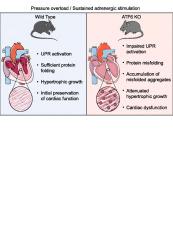当前位置:
X-MOL 学术
›
J. Mol. Cell. Cardiol.
›
论文详情
Our official English website, www.x-mol.net, welcomes your feedback! (Note: you will need to create a separate account there.)
ATF6 protects against protein misfolding during cardiac hypertrophy
Journal of Molecular and Cellular Cardiology ( IF 5 ) Pub Date : 2024-02-23 , DOI: 10.1016/j.yjmcc.2024.02.001 Christoph Hofmann , Marjan Aghajani , Cecily D. Alcock , Erik A. Blackwood , Clara Sandmann , Nicole Herzog , Julia Groß , Lars Plate , R. Luke Wiseman , Randal J. Kaufman , Hugo A. Katus , Tobias Jakobi , Mirko Völkers , Christopher C. Glembotski , Shirin Doroudgar
Journal of Molecular and Cellular Cardiology ( IF 5 ) Pub Date : 2024-02-23 , DOI: 10.1016/j.yjmcc.2024.02.001 Christoph Hofmann , Marjan Aghajani , Cecily D. Alcock , Erik A. Blackwood , Clara Sandmann , Nicole Herzog , Julia Groß , Lars Plate , R. Luke Wiseman , Randal J. Kaufman , Hugo A. Katus , Tobias Jakobi , Mirko Völkers , Christopher C. Glembotski , Shirin Doroudgar

|
Cardiomyocytes activate the unfolded protein response (UPR) transcription factor ATF6 during pressure overload-induced hypertrophic growth. The UPR is thought to increase ER protein folding capacity and maintain proteostasis. ATF6 deficiency during pressure overload leads to heart failure, suggesting that ATF6 protects against myocardial dysfunction by preventing protein misfolding. However, conclusive evidence that ATF6 prevents toxic protein misfolding during cardiac hypertrophy is still pending. Here, we found that activation of the UPR, including ATF6, is a common response to pathological cardiac hypertrophy in mice. ATF6 KO mice failed to induce sufficient levels of UPR target genes in response to chronic isoproterenol infusion or transverse aortic constriction (TAC), resulting in impaired cardiac growth. To investigate the effects of ATF6 on protein folding, the accumulation of poly-ubiquitinated proteins as well as soluble amyloid oligomers were directly quantified in hypertrophied hearts of WT and ATF6 KO mice. Whereas only low levels of protein misfolding was observed in WT hearts after TAC, ATF6 KO mice accumulated increased quantities of misfolded protein, which was associated with impaired myocardial function. Collectively, the data suggest that ATF6 plays a critical adaptive role during cardiac hypertrophy by protecting against protein misfolding.
中文翻译:

ATF6 可防止心脏肥大期间蛋白质错误折叠
在压力超负荷诱导的肥大生长过程中,心肌细胞激活未折叠蛋白反应(UPR)转录因子 ATF6。 UPR被认为可以增加内质网蛋白质折叠能力并维持蛋白质稳态。压力超负荷期间 ATF6 缺乏会导致心力衰竭,这表明 ATF6 通过防止蛋白质错误折叠来防止心肌功能障碍。然而,关于 ATF6 可以防止心脏肥大过程中有毒蛋白质错误折叠的确凿证据仍然悬而未决。在这里,我们发现 UPR(包括 ATF6)的激活是小鼠病理性心脏肥大的常见反应。 ATF6 KO 小鼠未能诱导足够水平的 UPR 靶基因来响应长期异丙肾上腺素输注或横主动脉缩窄 (TAC),导致心脏生长受损。为了研究 ATF6 对蛋白质折叠的影响,直接定量 WT 和 ATF6 KO 小鼠肥大心脏中多聚泛素化蛋白质和可溶性淀粉样蛋白寡聚体的积累。 TAC 后,WT 心脏中仅观察到低水平的蛋白质错误折叠,而 ATF6 KO 小鼠则积累了更多数量的错误折叠蛋白质,这与心肌功能受损有关。总的来说,数据表明 ATF6 通过防止蛋白质错误折叠,在心脏肥大期间发挥着关键的适应性作用。
更新日期:2024-02-23
中文翻译:

ATF6 可防止心脏肥大期间蛋白质错误折叠
在压力超负荷诱导的肥大生长过程中,心肌细胞激活未折叠蛋白反应(UPR)转录因子 ATF6。 UPR被认为可以增加内质网蛋白质折叠能力并维持蛋白质稳态。压力超负荷期间 ATF6 缺乏会导致心力衰竭,这表明 ATF6 通过防止蛋白质错误折叠来防止心肌功能障碍。然而,关于 ATF6 可以防止心脏肥大过程中有毒蛋白质错误折叠的确凿证据仍然悬而未决。在这里,我们发现 UPR(包括 ATF6)的激活是小鼠病理性心脏肥大的常见反应。 ATF6 KO 小鼠未能诱导足够水平的 UPR 靶基因来响应长期异丙肾上腺素输注或横主动脉缩窄 (TAC),导致心脏生长受损。为了研究 ATF6 对蛋白质折叠的影响,直接定量 WT 和 ATF6 KO 小鼠肥大心脏中多聚泛素化蛋白质和可溶性淀粉样蛋白寡聚体的积累。 TAC 后,WT 心脏中仅观察到低水平的蛋白质错误折叠,而 ATF6 KO 小鼠则积累了更多数量的错误折叠蛋白质,这与心肌功能受损有关。总的来说,数据表明 ATF6 通过防止蛋白质错误折叠,在心脏肥大期间发挥着关键的适应性作用。



























 京公网安备 11010802027423号
京公网安备 11010802027423号